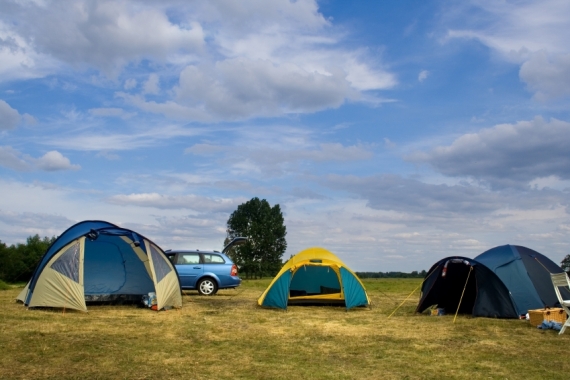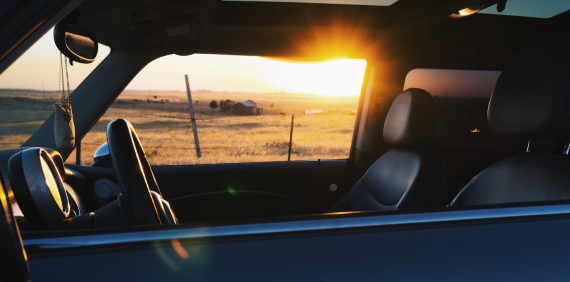Get the Most out of Car Camping
Car camping is a good first step into the world of camping. Here are a few tips on how to do it right.
by Josh Sadlier
When you go camping, communing with nature is kind of the point. But "car camping" – i.e., camping minus the hiking, meaning you drive directly to the campsite – can strike a nice balance between civilized convenience and Thoreau-style isolation. If you're planning some car-camping action this year, let us enhance it with these helpful tips.
Pack the Essentials, and Bring Some Extras
Those who have been on serious camping hikes know it's imperative to keep backpacks as light as possible. But if you're car camping, you can throw a number of nice-to-haves in your vehicle. Even if you have to park away from the campsite, the car is still just a short distance from your location; you can stroll over anytime and grab what you need.
This opens up a world of accessorizing possibilities. You can pack to enjoy your surroundings. If you'll be camping near a lake or river, bring the family kayak and floaties. Scenic bike paths nearby? Bring bikes and biking gear. But watch out – you’ll do yourself a disservice if you pack your car to the brim and can’t make heads or tails of where you put what. Try organizing your cargo in a way that suits your plans. For example, say you’re arriving post-sunset. Make sure flashlights are close by and tents are at the top of the pile for easy access.
Sleep in Comfort
Since you won't have to carry the tent for more than a few minutes, you can go big… or medium-sized. Depending on your needs, there are options like full-on luxury-tents that have multiple rooms and extra amenities. If that’s a little over the top, maybe opting for a larger tent is right for you – try a four-person tent for just two people. The goal is to give yourselves more wiggle room at night.
In any case, you can skip the super compact sleeping mats; instead, try a power-inflatable air mattress that connects to your car's (or its own) power supply. You can bring full-size pillows, too, and as many sleeping bags or blankets as you like. Of course, sometimes it’s necessary to use minimal equipment, but when you've got an entire vehicle at your disposal, you might as well enjoy a good night’s sleep.
Be Prepared (And Do NOT Stay Thirsty)
Firstly, it’s important to check out the details of your campsite if you haven’t already. You’ll be able to see which amenities the site has: bathrooms, showers, drinking water, and the like. Take all this into account when packing for your trip.
Car camping can help you be more prepared for the unexpected – especially useful if you’re just learning the ropes when it comes to camping. Instead of packing a small first-aid kit with scanty supplies, you can pick up a fully stocked kit with all manner of bandages, ointments and so on. Think too about related products like bug spray, sunscreen, toilet paper and hand sanitizer – bring enough for the whole crew. And don't forget to fill every nook and cranny with jugs of potable water if there won't be any available; there's no excuse for running out when you've got a dedicated transport vehicle nearby. In fact, we suggest bringing a lot more water than you think you'll need. When it comes to camping, always err on the side of being over prepared.
Go Gourmet
Car camping has the potential to be a chef's delight, provided you've got some sort of open-fire grill setup. Everything is "wood-fired" at this restaurant, so when in doubt, wrap some bacon around it. When car camping, you can bring along the tools you need to make a meal or even prepare food beforehand to transport to the campsite. And it doesn’t have to be dried! All it takes is some meal planning. Think portobello mushrooms, chicken, even steaks. You can also take camping favorites, like S'mores, and add a twist – try dipping the marshmallow in your favorite liquor before roasting, if you're into that sort of thing. The bigger the cooler you bring, the more fun dishes you can try. Just make sure someone's got a lighter.
Keep the Bears at Bay
If you're going car camping in or near a wooded area, assume there are bears about unless you know better, and plan accordingly. That means you must not leave food in your car. It's not unheard of for bears to tear cars apart in order to get at anything that smells tasty. To a lesser degree, raccoons can be threats as well. Most car camping locations have bear boxes if needed. For those that aren’t so well equipped, there's something called a "bear canister" that can keep your food from prying paws. According to REI, bear canisters are actually required at a number of parks across the country. Since you're car camping, you'll probably have space for as many as you need, but this is definitely an important research task before you embark.
Stay on the Grid
As romantic as it may sound to leave all your devices at home, let's be honest: most of us rely on our phones and gadgets for more than just Facebook check-ins. If you need your electronics, you're going to need electrons, and that's where your mobile generator – a.k.a. your car – comes in. More and more cars these days feature actual outlets that accept household plugs, so if yours is among them, you've got it made. But you can also convert any car's cigarette lighter into a little power station, thanks to devices that provide both standard outlets and USB connectivity. Just remember that your car battery can only recharge itself when the engine's running, so avoid using up all the juice between drives.
Have a Good Old Time
At the end of the day, car camping is all about having fun. There are no purists in this sport, just good people who want a little escape from the daily grind. So bring whatever you want, go wherever your vehicle can take you, and pitch that tent when you're ready. It sure beats the heck out of a one-star motel.
|
|
Track Your Service Records
Get Recall Alerts
Get Updated Value Estimates on Your Car.
Go to a Review
Similar Articles
Popular Car Articles
Latest Car Reviews
Auto Tools
Local Guides
All Guides
Alabama
Alaska
Arizona
Arkansas
California
Colorado
Connecticut
DC
Delaware
Florida
Georgia
Hawaii
Idaho
Illinois
Indiana
Iowa
Kansas
Kentucky
Louisiana
Maine
Maryland
Massachusetts
Michigan
Minnesota
Mississippi
Missouri
Montana
Nebraska
Nevada
New Hampshire
New Jersey
New Mexico
New York
North Carolina
North Dakota
Ohio
Oklahoma
Oregon
Pennsylvania
Rhode Island
South Carolina
South Dakota
Tennessee
Texas
Utah
Vermont
Virginia
Washington
West Virginia
Wisconsin
Wyoming
Alabama
Alaska
Arizona
Arkansas
California
Colorado
Connecticut
DC
Delaware
Florida
Georgia
Hawaii
Idaho
Illinois
Indiana
Iowa
Kansas
Kentucky
Louisiana
Maine
Maryland
Massachusetts
Michigan
Minnesota
Mississippi
Missouri
Montana
Nebraska
Nevada
New Hampshire
New Jersey
New Mexico
New York
North Carolina
North Dakota
Ohio
Oklahoma
Oregon
Pennsylvania
Rhode Island
South Carolina
South Dakota
Tennessee
Texas
Utah
Vermont
Virginia
Washington
West Virginia
Wisconsin
Wyoming










